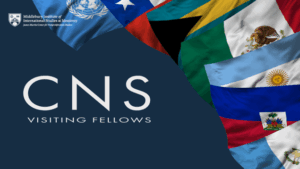Call for CNS Visiting Fellows Program Applications
Apply for the Spring and Fall 2026 Visiting Fellows program.
The CNS Visiting Fellows Program is one of the world’s only professional training programs devoted exclusively to WMD nonproliferation, arms control, and related security issues. Established in 1991 with a primary focus on practitioners, researchers, and journalists from the Newly Independent States of the former Soviet Union, the program expanded in the late 1990s to include candidates from East Asia, and then again in the past two decades to other regions, including many countries from the developing world. To date, more than 370 young professionals from over 30 countries have received training through the Visiting Fellows Program.
Many past Fellows currently hold senior positions in their respective institutions representing their governments at high-profile international nonproliferation, nuclear security, and WMD related meetings. Not only do these CNS-trained Fellows contribute effectively to the work of their delegations/institutions, but they are also part of a global network of practitioners, scholars, and analysts known affectionately as the “CNS mafia.” Other alumni contribute to their countries’ nonproliferation and nuclear security capacity-building efforts by developing academic and professional training courses. Young scholars and faculty have an opportunity to observe first-hand different methodologies such as simulations that they can apply in their home institutions.
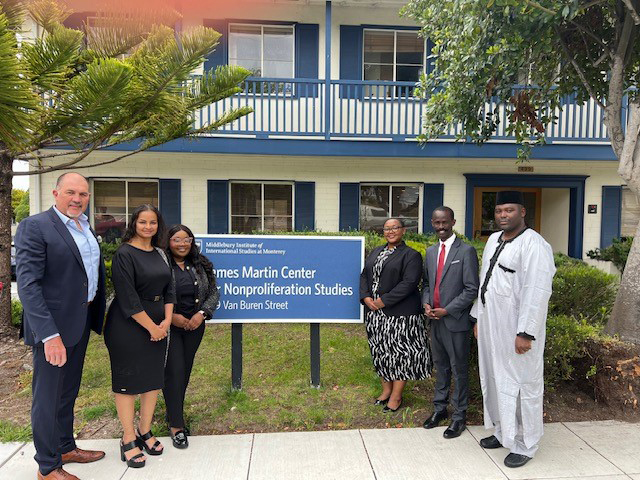
Spring 2023 fellows with program director Jean du Preez.
Objectives
The Visiting Fellows program offers intensive training to junior and mid-career professionals in foreign ministries and other relevant government departments, national export control and regulatory bodies, journalists, research and academic institutions to obtain an in-depth understanding of the nonproliferation and disarmament regime and related international policy-making process. The interdisciplinary curriculum combines policy and technical aspects of nonproliferation and arms control issues, as well as nuclear security and WMD-related technologies. Selected Visiting Fellows develop in-depth understandings of legal, political, regional, and technical aspects of WMD nonproliferation, and develop the skills necessary to have a positive impact on arms control and nonproliferation policy in their respective countries and in the international arena.
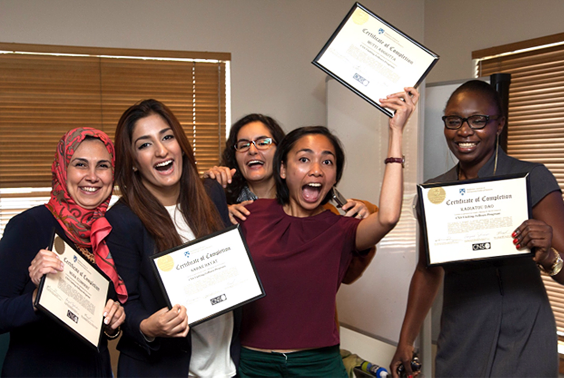
Fall 2015 fellows from Egypt, Pakistan, Indonesia, and Mali proudly display their program completion certificates.
About the Program
The Visiting Fellows Program is 3 1/2 months long in duration and offered twice a year coinciding with the academic calendar of the Middlebury Institute – the Spring session typically runs from early February to mid-May, while the Fall season is normally offered from early September to mid- December. While typically offered in-person only, CNS is investigating a hybrid online program for the Spring Semester while the Fall semester will be in-person only.
Program instructors include U.S. and international experts with backgrounds in history, political science, international relations, nuclear physics, and life sciences. Throughout the Program, fellows interact regularly with CNS/MIIS experts and professors and visiting experts, deepening their knowledge of current WMD policy, science, and technologies.
The curriculum consists of a series of focused lectures and seminars on international nonproliferation and disarmament topics taught in a small-group seminar format by CNS experts and visiting scholars. Applied research is a key component of the Program, and Visiting Fellows are assigned to CNS research advisors, who guide them in the design and implementation of their research projects. An additional important component of the Program is participation in active learning through role-playing in simulations exercises including a very realistic semester-long arms control negotiation simulation offered in the Fall. Visiting Fellows are also able to audit selected MIIS Nonproliferation and Terrorism Studies Master’s degree-level courses, including the Introduction Weapons of Mass Destruction Nonproliferation course, and the Science and Technology for Nonproliferation and Terrorism Studies. View an example of the Visiting Fellows syllabus.
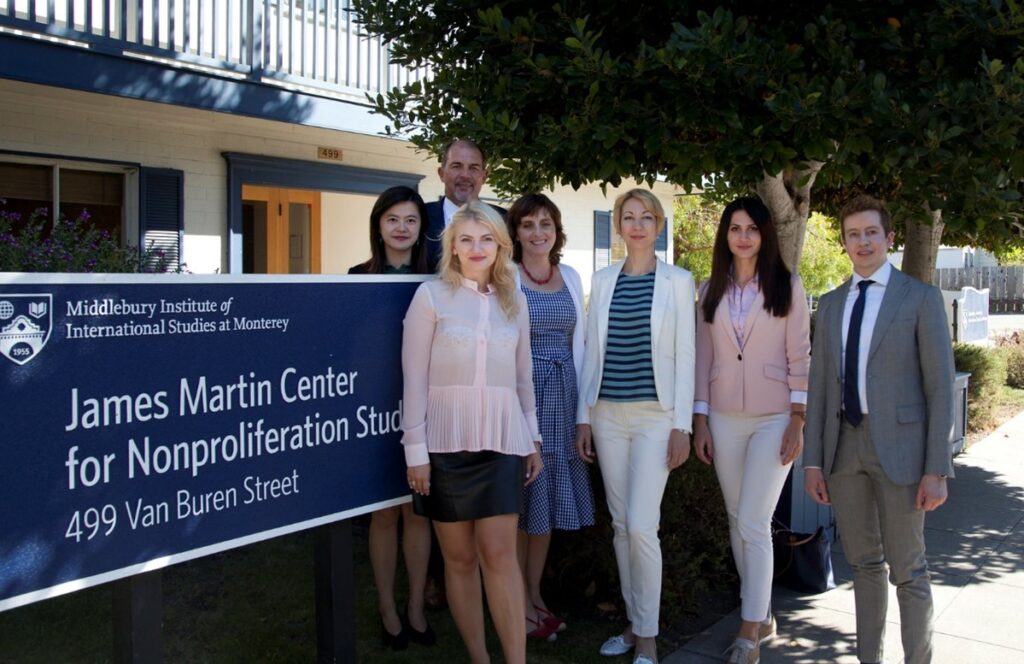
Fall 2019 Fellows from China, Ukraine, Serbia and Costa Rica with Visiting Fellows program director Jean du Preez and Ms. Margarita Kalinina-Pohl, CNS program director for CBRN security
Program Structure
Offered twice a year (spring and fall) in Monterey, California (CNS is investigating a hybrid online program for the Spring Semester while the Fall semester will be in-person only).
- Spring session: early February – mid-May
- Fall session: early September – mid-December
A limited number of qualified candidates will receive a full stipend to cover their tuition fee, housing, health insurance and a daily living expense allowance. Provided space is available, additional candidates could be admitted for a fee, which will be determined on an individual basis
Program is offered in small-group settings (4-5 participants/session)
Upon successful completion of their training and their research presentations, Fellows receive Program certificates
Program Participants
Visiting Fellows are typically selected from emerging and developing countries, and could include:
- Diplomats, experts, and officials from national governments
- Non-governmental experts from think tanks, academia, and industry
- Researchers/scientists/engineers
- University instructors
- Other professionals
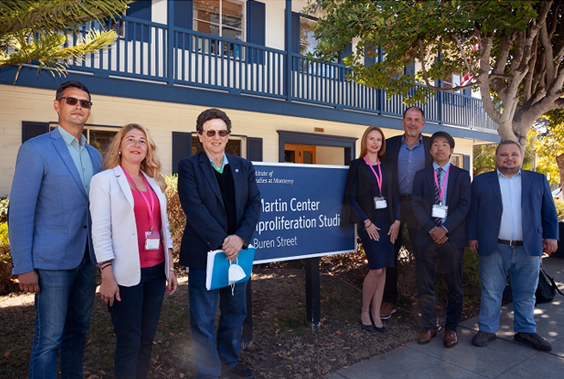
Fall 2021 fellows from Bulgaria, Japan and Ukraine with CNS founding Director, Prof William Potter and Visiting Fellows program manager Mr Jean du Preez
Apply to the Visiting Fellows Program
Eligibility
Qualified candidates must:
- Be full-time professionals (consideration may be given to qualified candidates pursuing PhDs or post-doctoral research)
- Demonstrate professional engagement and interest in the field related to WMD nonproliferation and nuclear, biological, and chemical security and public safety, or other related fields
- Demonstrate written and verbal English fluency
- Qualify for U.S. J1 visas (U.S. citizens are eligible)
Application Deadline
Visiting Fellows are typically selected at least 3 months prior to the start of the Program.
Application Process
Interested candidates are invited to email the Visiting Fellows program director with the following application material:
- Current resume/CV.
- At least letter(s) of recommendation from current/past supervisors/mentors.
- A brief statement of purpose (about 500 words) explaining current experience in the field of nonproliferation or related fields, the relevance of this fellowship to professional goals, and when they wish to complete the Program.
- Motivations for funding (A limited number of qualified candidates will receive a full stipend to cover their tuition fee, housing, health insurance and daily living expense allowance).
Contact Information
For more information about the Visiting Fellows Program, please contact Jean Du Preez, CNS Program Director for Education and Training: [email protected].

